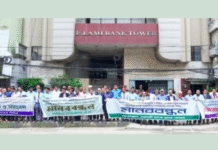Bangladesh to lose RMG business to ‘homecoming’?
Western mass-market brands may reduce sourcing countries like Bangladesh for manufacturing readymade garments (RMG) in the coming years, forecasts a US firm.
The apparel marketing companies, it suggests, are likely to gain from sourcing Mexico or Turkey, in the neighbourhood of the US and Europe respectively, instead of Bangladesh.
“A US apparel company that moves production of a basic jean from either Bangladesh or China to Mexico can maintain or even slightly increase its margin, even without higher full-price sell-through,” McKinsey noted in a report titled “Is apparel manufacturing coming home?” prepared on the basis a survey conducted jointly with Sourcing Journal.
It emphasised the apparel companies’ need to focus on nearshoring, automation, and sustainability to meet customers’ needs.
The economics of nearshoring are gaining attraction, and according to McKinsey, a 5-percentage point increase in sell-through would make up for the higher labour costs encountered closer to home.
“Costs are equalising, even in shifts from low-cost countries, such as Bangladesh, to nearshore markets,” McKinsey said.
“If a US company were to source a pair of jeans from Mexico instead of Bangladesh, the product’s margin before SG&A would increase by about 3 percentage points.”
The US firm called ‘chasing cheap’ products in Asia outmoded as low-cost has, it insisted, in some cases, become “synonymous with low-quality and low-compliance in a world where transparency and ethics are in high demand, too.”
By 2025, 82 per cent of respondents in the McKinsey-Sourcing Journal survey expect to move more than 10 per cent of their total sourcing volume to nearshouring locales.
Such a scenario may affect potential growth of Bangladesh’s garments, a more than US$36-billion industry with the highest concentration of labourers.
However, a Bangladeshi manufacturer rejected such report as mind game by brands and buyers.
“We’ve the higher capacity to make low-cost products. When our costs of production will increase in the next 10 years or so, the costs will also increase in Mexico and Turkey. We will still remain competitive,” said Fazlul Haque, a former president of Bangladesh Knitwear Manufacturers and Exporters’ Association.
Bangladeshi exporters now need 45-60 days to reach apparel products to Western destinations, compared to 110 days required earlier.
Before the US backed out of the move to join Trans-Pacific Partnership, a major Bangladeshi exporter expressed apprehensions that Bangladeshi manufacturers might lose their competitiveness.
The new findings of the McKinsey indicate mass-market apparel players must make “bold” investments in nearshoring and automation “immediately” if they have any hopes of success in today’s altered industry.
The mass-market apparel brands are now competing with niche and nimble online startups built for better response to consumer demands and changing trends, said the report.
* This report, originally published in Prothom Alo Bangla online, has been rewritten in English by Khawaza Main Uddin









